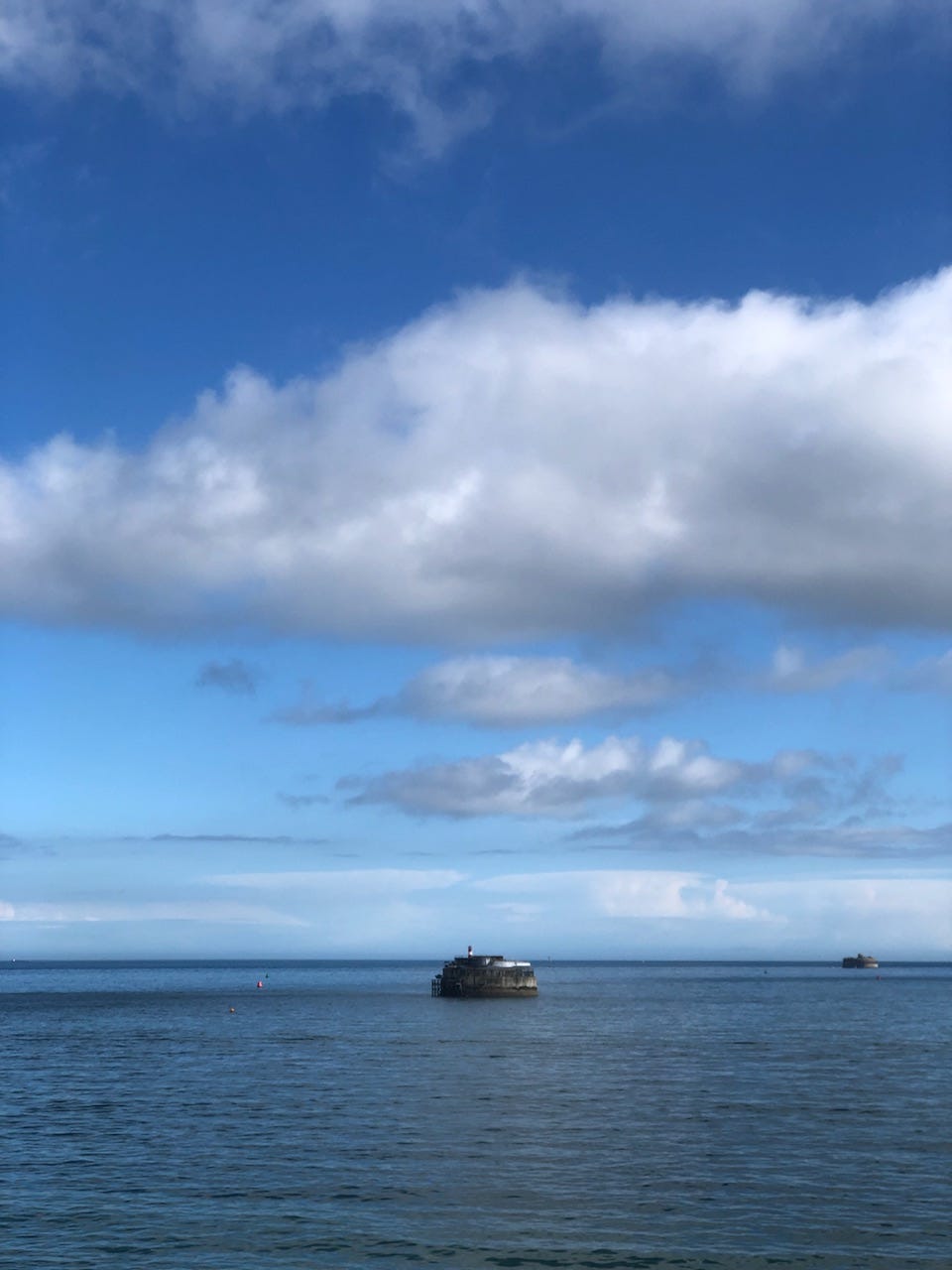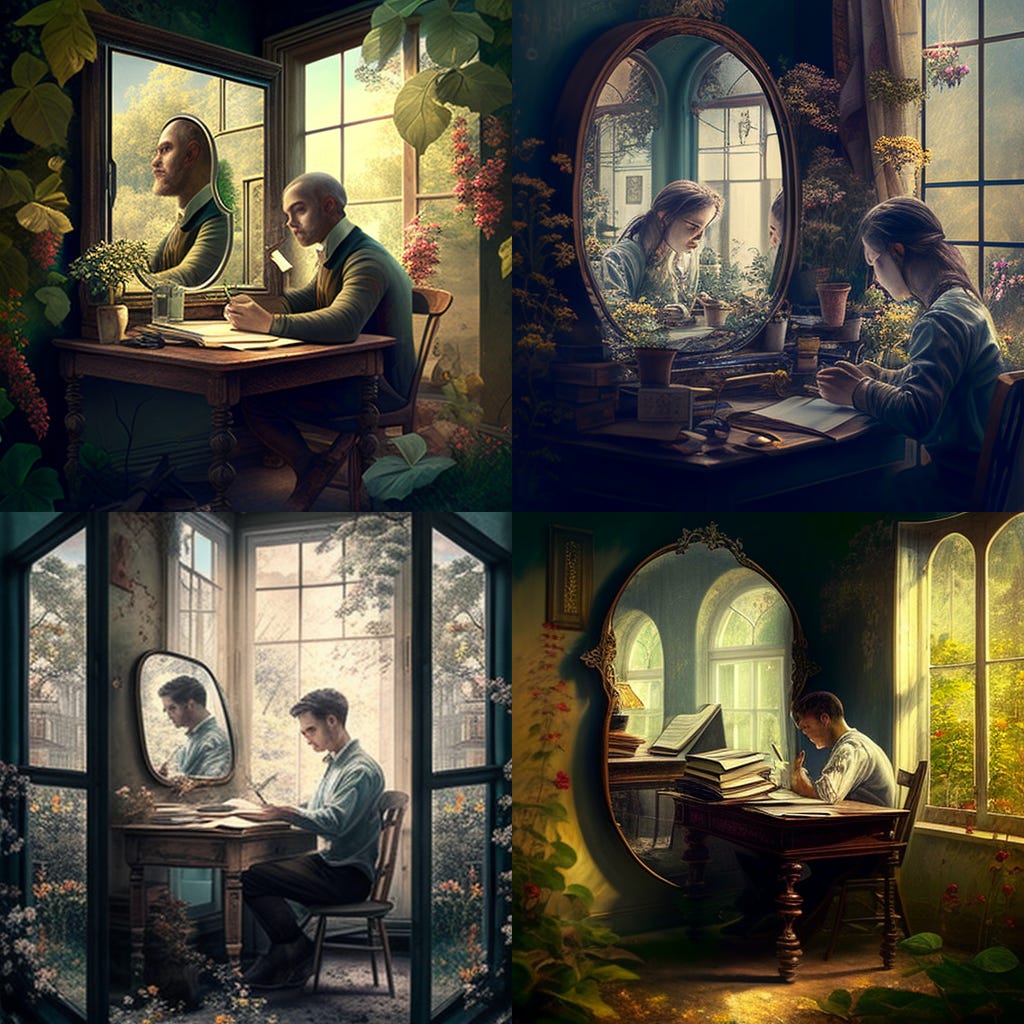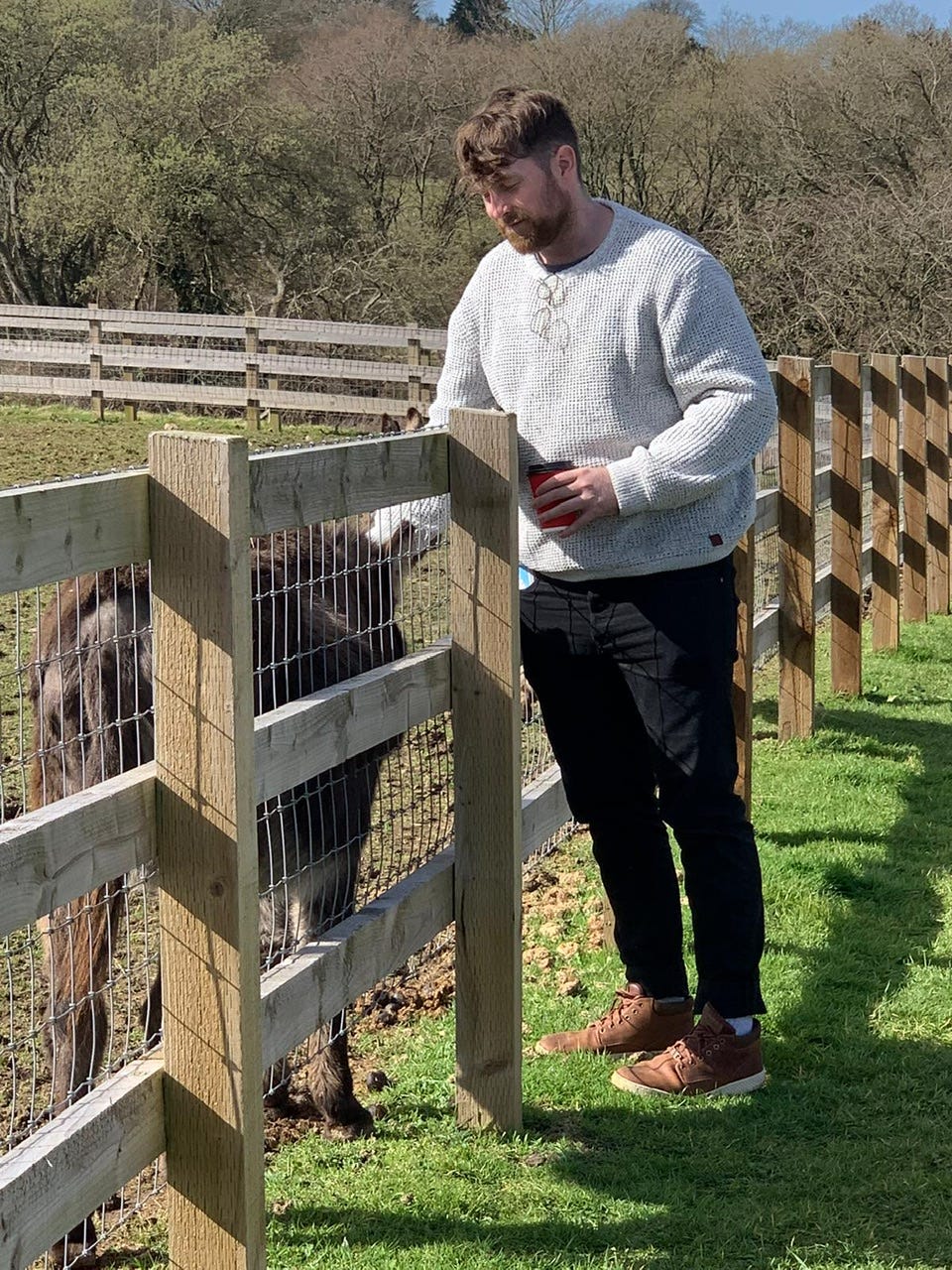journal — spring
On reflections, robots, and donkeys
Is the constant desire to tweak one’s approach to something the trait of a flexible or indecisive person? I’m not sure — it probably depends on whether the person has their ‘eyes on a prize’ or keeps wildly stabbing at new things to try for the momentary sake of it. Frankly, the loud, stuttering radio blasting out of multiple busted speakers in this hotel lobby aren’t allowing much headspace to think it through in any helpful way.
Very last minute, I decided to try something slightly different with that & this (again). Unlike last time, I’ve finished this letter before it was sent. That said, this one isn’t exactly what I want to do with the letter either (I’ll explain what that is in a moment). But, as ever, it’s all learning out loud.
1 — Springen.
The season of spring wraps & binds its name’s hungry roots around the Dutch & German springen. Early on, this was the head of a well and rushing out in a stream — or, figuratively, to originate. It was a time with many names until the late 1300s, when springing time came into popular use — most plants, dormant through autumn & winter, had finally decided to show themselves.
The gods were here before & since it was named. Mother Earth gave birth to the Green Man in the depths of winter, who grew in spring before his autumnal death. Ēostre, Flora, Persephone. (Great books from the last one.) This evening, the sun sits directly over the Earth's equator, its rays preparing to head north. Renewal, rebirth, beginnings. Baby lambs. Rabbits laying eggs. (?)
It’s a time for new life to be imagined & lived.
But to realise new life, one needs to know where they already are.
2. Ethnography (i).
Here’s Peter Schjeldahl (emphasis my own) in The New Yorker:
I don’t trust my memories (or anyone’s memories) as reliable records of anything — and I have a fear of lying. Nor do I have much documentary material. I’ve never kept a diary or a journal, because I get spooked by addressing no one. When I write, it’s to connect.
When I started writing criticism, in 1965, in almost pristine ignorance, I discovered that I was the world’s leading expert in one thing: my experience. Most of what I know in a scholarly way about art I learned on deadlines, to sound as if I knew what I was talking about — as, little by little, I did. Educating yourself in public is painful, but the lessons stick.
To limber your sensibility, stalk the aesthetic everywhere: cracks in a sidewalk, people’s ways of walking. The aesthetic isn’t bounded by art, which merely concentrates it for efficient consumption. If you can’t put a mental frame around, and relish, the accidental aspect of a street or a person, or really of anything, you will respond to art only sluggishly.
True story: a friend received a preliminary diagnosis suggesting advanced breast cancer. Normally shy, she took this as license to tell or show everyone in her circle how little she liked or respected them. False alarm. It was cat-scratch fever. She moved overseas. ‘When a man knows he is to be hanged in a fortnight, it concentrates his mind wonderfully,’ per Samuel Johnson.
& here’s Annie Ernaux (the quote is from Shame, published September this year by Fitzcarraldo Editions & used in this New Yorker article):
Naturally I shall not opt for narrative, which would mean inventing reality instead of searching for it. Neither shall I content myself with merely picking out and transcribing the images I remember. I shall process them like documents, examining them from different angles to give them meaning. In other words, I shall carry out an ethnological study of myself.
3. Ethnography (ii)
Here’s the sequence that came to me.
Cultural stuff — the love & freedom & stardust in death, sketches of ruined castles, a ten-minute scene of Rooney Mara eating pumpkin pie — has, in kaleidoscopic forms, changed me.
Experience of cultural stuff is so subjective — our perceptions are achingly personal and equally-kaleidoscopic.
When I write about cultural stuff, then, what I’m really writing about in a big way is… me — interpretation is so knotted with a single mind.
This, alongside frequent thoughts.
I was taught, growing up, that I was ‘too much’ — that I’d cast too many eggshells to the ground to be be considered acceptable. So: I bottled. I kept quiet & sought satisfaction elsewhere & hurt myself, slowly, over years. Occasionally, I’d burst out — to be told that I’d never change.
Then, I went the other way, sharing everything with everyone.
Then, I stopped for a while, to think about what was actually right for me. I depended on the right people. I got some help. I made changes. I started to accept that the people I might want most to try, never would, and so it’s easier to remove myself for my sake.
In learning to accept & listen to myself more, to not show myself a constant flow of hatred for no real, rooted reason other than it was taught to me, I need to maintain self-reflection.
Journalling feels right.
There’s a problem, but possible crossing here — a solution.
The time I have to write is spent on this letter.
I should really be journalling, but don’t make the time. But — like here — it seeps in. It’s a genre I seem to love with other writers, no matter how challenging they find it, but haven’t mastered myself yet — because this is the only place I do write. It comes out messy. Writing is an attempt to connect — it requires a willingness to bare oneself. You have the potential to be the expert of your own experience, by reflecting & challenging & growing. Art is everywhere and its interpretation can only be seen through my lens by me.
If journalling is a partial record of me, and culture a key influence, then perhaps I simply focus on journalling, then select & edit what works from in there at the end of each season.
So, this letter can become a cultural lens of my own journal.
4 — A long, long time.
I didn’t have money for the console, let alone the game, when The Last of Us first hit the shelves in 2013. Instead, I watched other gamers on YouTube play, as if it was television. The series adaptation was beautiful — the third episode was, by far, one of the best episodes of any series I’ve ever watched. Bill’s (Nick Offerman) short cover of Long Long Time by Linda Ronstadt felt both small and biblical.
5 — On selective reading.
It just kept looking at me — this app, peeking its accusatory eye out with a near-daily notification of [1] or [3] or [5]. I'm not someone with a messy phone. The impulses and stresses I feel towards undone, cluttered things is physical.
So, I archived everything, unsubscribed to everything, made everything pearly white, then started with one at a time.
While the attention economy generates power from exploiting base impulses and moments of attention, a healthy information economy would derive power from the strength and quality of relationships that are built over time.
That’s from this On Substack letter — a goal of mine before the next season is to get my website in order, but also to get this letter set up to better allow for community interaction.
It’s also a sign that I know the content on there is good & wanted & helpful but that it just got lost in competing with others. That’s been rectified.
There’s also the International Booker prize — the longlist has been announced, and this list of thirteen things about the nominees was a fun read.
6 — On how I write.
I wake just before 5am because the cat demands her breakfast. Sometimes, I push her off the bed. Most times, I accept that my rhythms have fallen in line with the squeal of her small stomach. I squeeze half a pouch of grain-free, ‘human-quality’ meat into a raised bowl. (Less likely to give her tummy problems, I read.)
Then, it is time to write.
I play video games for two hours — cars powered by rocket fuel barrel around an arena, frantically trying to back-bumper an oversized ball into the opponent’s goal. It’s hyperbolic explosions and colour saturation cause me, as I drive to the only local coffee shop that opens this time in the morning (late, more often than not), to daydream about angles & perfect timing. I park, order a large decaf (to help / not further aggravate my anxiety (I ask for hazelnut syrup)), and sit at the seat I’ve sat at for a year, nearly every Saturday & Sunday morning.
Then, it is time to write.
For an hour, I research phones to replace the one I’ve had for six years. I research note-taking apps to replace the one I have, which works for my current phone / devices but wouldn’t if I switched — it needs to be the right decision, lest it stop me from writing. I turn on an app that plants a tree if I focus for a pre-decided amount of time, not switching apps. I check my messages first. On my laptop, I check for a full range of AI-powered art creation tools, thinking it would be cool to open these letters each time with some abstract image that represents the narrative arc of what I’d written this time. I consider editing my last letter — it was sent out automatically, accidentally, before I’d had a chance to edit. But it’s gone now, unlikely to be read anyway.
So, it is time to write.
I write this, then I drive home.
Repeat, every Saturday & Sunday.
Noam Chomsky, in this NY Times article, compared ChatGPT — an AI writing programme — to the ‘prehuman or nonhuman phase of cognitive evolution’. It may have the ability to say what was, is, and will be, but cannot say what could or could not be the case on any particular topic.
Here’s an example. Suppose you are holding an apple in your hand. Now you let the apple go. You observe the result and say, “The apple falls.” That is a description. A prediction might have been the statement “The apple will fall if I open my hand.” Both are valuable, and both can be correct. But an explanation is something more: It includes not only descriptions and predictions but also counterfactual conjectures like “Any such object would fall,” plus the additional clause “because of the force of gravity” or “because of the curvature of space-time” or whatever. That is a causal explanation: “The apple would not have fallen but for the force of gravity.” That is thinking.
The content writer in me: It is slayer of the blinding white page. For clients who need a quick turnaround on subjects I’ve no prior knowledge in, it is the new first step — available in five seconds, for free.
The creative writer in me: This is the perpetual self-churn of mediocre internet slurry. It isn’t some glorious, streamlined step forward. It shows how low we stooped.
7. On contentedness.
Contentedness is a feeling I’ve been thinking about recently.
I mean, if you’re not just a little content when scratching behind a donkey’s ear — drink in hand, on a warm day, the faint smell of manure in the air — something’s gone seriously wrong. (I think this one was called Moses.)
I’m on the Isle of Wight for a few days, to visit family & explore a little. It’s a childhood home of mine.
Ferry crossing (top of letter), tacky hotel, cliff-top pub, birthday cake, biscuit tin villages, crumbling roads, donkeys in their sanctuary, roast dinner with family, ice cream by the coast under a grey sky, dog fur & tails & cuddles, coin pusher arcades & crazy golf on the pier, garlic farm.
It was Mother’s Day yesterday. I feel grateful that mine — tumultuous relationship though it has been in the past — has shown the capacity to change while holding onto the things that make her who she is. She’s a special lady.
The months behind me lay in starched, twisted tatters. They’ve left me on late night support lines and provided me with more than enough points for perspective — the realisation that very little matters when someone you love so much can’t give you one of their baby-bird cuddles anymore, smelling faintly of fag smoke, damp coats, and lavender. In many moments, it’s all felt way too little or far too much. Today, recently, I feel content. I’m centred.
I’ll finish with a short i-like-you-a-lot letter to my new team.
I’ve had a rough few years. The last few jobs I’ve had have only exacerbated difficulties elsewhere. I’ve just about kept myself together. At work, I’m now called-out on my self-criticism, complimented on good work, I’m lent books, joined for walks around the town, and distracted by food & film chat. (& dogs.)
It’s such a simple thing but I like my job. For the first time in a long time, it is both challenging and enjoyable; firm but friendly; I’m seen as someone with lots of experience, yet I’m keen and offering to try new things.
There’s a fog lifting.






